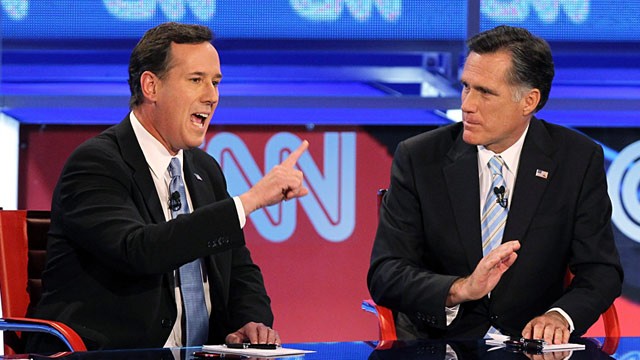
The growing divide between Democrats and Republicans and their
lack of cooperation, compromise and civility has contributed heftily to
the public's
waning trust in government. This is not surprising; as parties
dish out disparaging attacks against each other and their ideals, the public
internalizes increasingly negative views of both parties. However, a
similar trend is now happening within the Republican Party.
A recent NBC/Wall
Street Journal poll finds that the aggressive and heavily publicized
primary season has damaged the party and its candidates. The poll reveals
that four in 10 adults have a less favorable view of the Republican Party due
to their behavior in the nominating process, and almost 70 percent of
respondents describe the GOP primary season in a negative manner.
Republicans use words such as "unenthusiastic, concerned and
depressed" to describe how the primary discourse leaves them feeling about
their party’s leaders. With Super Tuesday quickly approaching,
intra-party warfare is doing very little to inspire voters for a brighter
future.
The question becomes, will greater intra-party disagreement lead
to further gridlock between the parties or will it engender an opportunity for
compromise down the road? Thus, with less group-think and more individual
positions within parties, will party platforms weaken and strange bedfellows
emerge? If the tea
partiers in the House tell us anything, the answer is no. We
should expect to see more disagreements rather than unlikely coalitions.
To be fair, primaries necessitate intra-party competition so using
them as a barometer for party unity is misguided. Nevertheless, the poll
does reveal that the public is unimpressed with incivility, whether it is from
across the aisle or between members of the same party. As Republican
candidates vie for support leading up to Tuesday’s delegate contest, maybe it
is time to reconsider the adage “nice guys finish last.” In a political
climate full of animosity, a little camaraderie might go a long way.

I agree that a public demonstration of civility and camaraderie would not only be a welcome change of pace but also a potential boon to Republican candidates' electoral support. However, such an approach is antithetical to the inherent party activist-fueled extremism that tends to dominate the primary election process. While extreme politics do not necessarily equate to uncivil behavior, those who hold more extreme political views (on either side) are more likely to have an emotional attachment to whatever issues their views address. This, in turn, makes it easier for them to slip into an emotional, rather than objective policy-based, dialogue. In addition, it makes those candidates who are willing to resort to demagogic oratory more effective when speaking to the party activists in question.
ReplyDeleteThis discussion brings us back to the most basic question of all on this topic - does incendiary rhetoric work? Previously, the answer always seemed to be a resounding, though unfortunate, yes. The statisticss that you discussed indicate that maybe this is finally beginning to change. By turning the negativity inward within the party, Republican politicians may finally have taken the rhetoric one step too far.